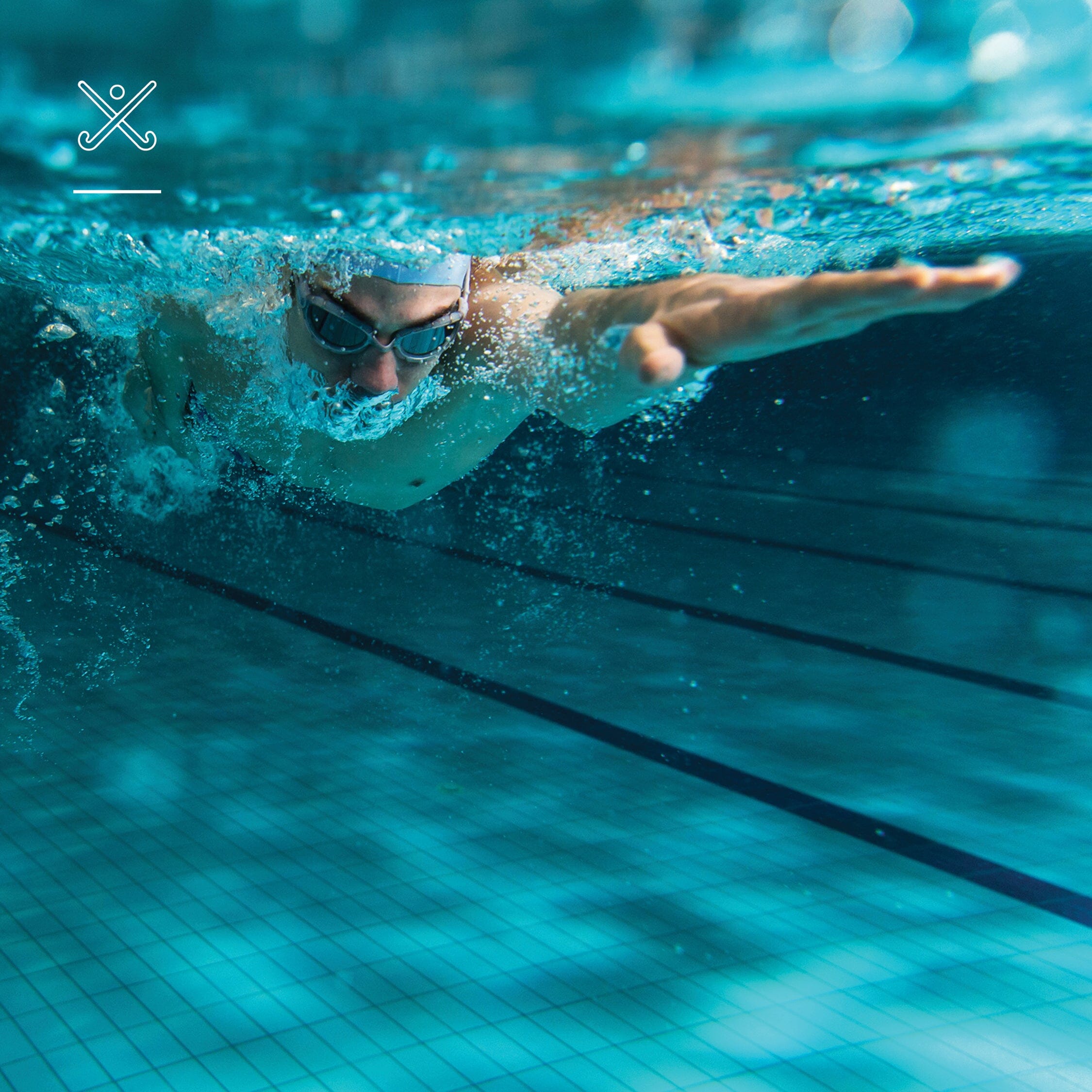Swimming works out the whole body and, by exercising in water, not only is your body supported, but the water also provides extra resistance to get you working harder.
Some of the many fitness benefits of swimming include:
- Nearly all of your muscles are used during a swimming session, providing an all-over body workout.
- Cardiovascular and respiratory health are improved by keeping the heart rate up and increasing lung capacity.
- Endurance, muscle strength and tone are improved through swimming.
- It provides an efficient way to burn calories and lose weight – 30 minutes of slow-paced front crawl stoke burns around 250 kcals on average, versus 99 kcals walking at a 3-mph pace, or 300 kcals running at a 6-mph pace. Whilst 30 minutes of butterfly stroke can burn around 400 kcals¹.
- It increases metabolic rate, boosting energy levels. Lean muscle results in an increase in the calories burnt. Cold water swimming further boosts metabolism, as the body adapts to burning fat in order to keep warm.
The physical benefits are only some of the benefits you can enjoy as a regular swimmer. Swimming has also been shown to reduce stress and anxiety, improve mood, self-esteem and sleep².
A study looking at the effect of continuous aerobic exercise on lung function and quality of life in people with asthma found that swimming made a significant improvement on lung function and that aerobic exercise improved quality of life on asthmatics³.
Swimming and aging
One of the key benefits of swimming is that, because the water supports the body, that this sport or recreational activity can be enjoyed by most people. This includes people recovering from an injury, pregnant women and those who are maybe less active than they once were.
A study looking at the long-term effects of swimming found that it has the potential to slow down the aging process by decades.
Regular and relatively intense swimming has been shown to have substantial benefits in delaying the changes to blood pressure, muscle mass and lung function, which tend to occur as we age.
Participants in the study swam 3-5kms, three to five times a week and were found to delay the aging process by years. The decline caused by aging was in many cases delayed until they reached the age of 70.
The study found that the health and wellbeing improvements could be seen with recreational swimming and that any amount of swimming was beneficial, particularly in less active people⁴.
Cold water therapy
Whilst we are on the topic of water, cold water therapy is worth highlighting. Lately it has gained popularity and you may well have heard about the Wim Hof Method, combining cold water immersion and breathing techniques to improve several areas of health.
Cold water therapy increases circulation. When the body is exposed to cold temperatures, blood flow is increased to ensure that your core temperature is maintained to protect the function of your vital organs.
When exposed to cold temperatures, brown fat produces heat to maintain body temperature – this process is known as thermogenesis. Stimulating thermogenesis increases metabolism and burns fat. A recent Scandinavian study looked at a cohort of winter swimmers who combined cold-water immersion and hot sauna. Compared to the control group, these swimmers had burned more calories and their bodies were comfortable at a lower core temperature⁵.
Cold water immersion can also trick the body into a relaxed state, due to the interplay between the heart and the vagus nerve. From a physiological perspective, when we are feeling stressed, the sympathetic nervous system is activated, whilst when we are feeling relaxed, the parasympathetic nervous system (PNS) is activated. When you encounter a blast of cold water, the heart stimulates the vagus nerve and in doing so resets the nervous system to a relaxed state⁶.
Cold water therapy is also purported to boost your immune system, improve energy and sleep and reduce pain⁷.
So why not dip your toe into that cold water and try a cold-water swim or alternate several cycles of alternate hot and cold blasts at the end of a shower.
There is science to back up the benefits of cold-water therapy. However, there are other ways to improve circulation [link to blog] and metabolism can be improved through increased lean muscle. Therefore, if you do have a health condition, related to breathing or heart health, you may be safer to avoid shocking the body a blast of cold water. Please consult your health practitioner if you are in any doubt.
Suzy Walsh
BBA (Hons)., BNat., mNMHNZ
Registered Naturopath & Medical Herbalist
References:
1. Just Swim (2018, October 30). Best swimming stroke for weight loss,Benefits of the strokes. Just Swim.
2. Oliveira, DV de, Muzolon, LG, Antunes, MD, & Nascimento Júnior, JRA do. (2019). Impact of swimming initiation on the physical fitness and mental health of elderly women. Acta Scientiarum. Health Sciences, 41 (1), and 43221. doi: 10.4025/actascihealthsci. v41i1.43221
3. Wu, X., Gao, S., & Lian, Y. (2020). Effects of continuous aerobic exercise on lung function and quality of life with asthma: A systematic review and meta-analysis. Journal of Thoracic Disease, 12(9), 4781-4795. doi:10.21037/jtd-19-2813
4. Swimming in the Fountain of Youth: IU newsroom: Indiana University. (n.d.). Untitled Document. https://newsinfo.iu.edu/news/page/normal/4030.html
5. Søberg, S., Löfgren, J., Philipsen, F. E., Jensen, M., Hansen, A. E., Ahrens, E., Nystrup, K. B., Nielsen, R. D., Sølling, C., Wedell-Neergaard, A., Berntsen, M., Loft, A., Kjær, A., Gerhart-Hines, Z., Johannesen, H. H., Pedersen, B. K., Karstoft, K., & Scheele, C. (2021). Altered Brown fat thermoregulation and enhanced cold-induced thermogenesis in young, healthy, winter-swimming men. Cell Reports Medicine, 2(10), 100408. doi: 10.1016/j.xcrm.2021.100408
6. Jungmann, M., Vencatachellum, S., Van Ryckeghem, D., & Vögele, C. (2018). Effects of cold stimulation on cardiac-vagal activation in healthy participants: Randomized controlled trial. JMIR Formative Research, 2(2), e10257. doi: 10.2196/10257
7. Healthline. (n.d.). Cold water therapy: Benefits of cold showers, baths, immersion therapy. Healthline


![Never Grow Old - Longevity Issue [Nutrition Business Journal]](http://scienceresearchwellness.com/cdn/shop/articles/NBJ_Post_-_LinkedIn.jpg?v=1692742979&width=1500)
![Circulatory system care "vital" [NZHERALD]](http://scienceresearchwellness.com/cdn/shop/articles/SRW_-_News_Clip_-_Post_-_Cir1_-_D1_dfadc7dc-c57a-4f80-82bd-4fdb5ba5f0cd.jpg?v=1692742734&width=1500)
